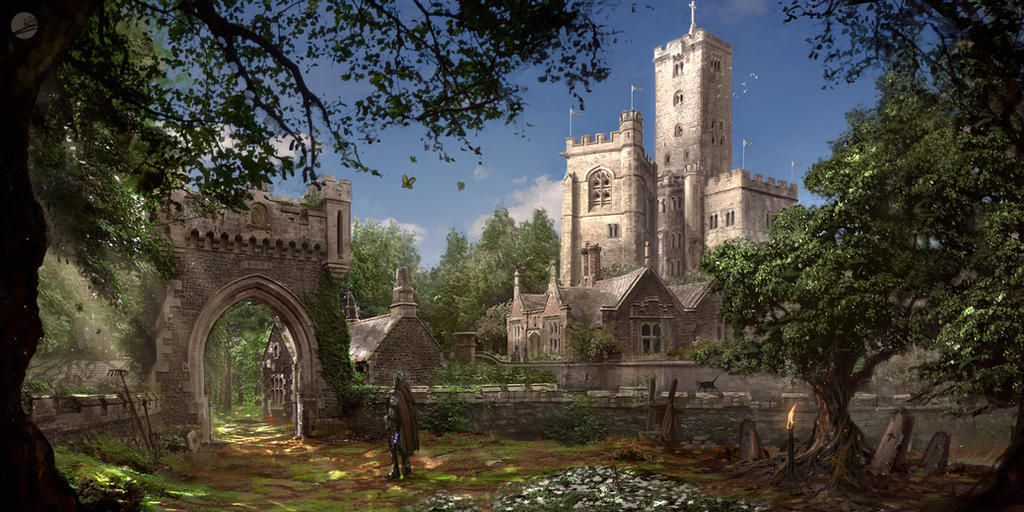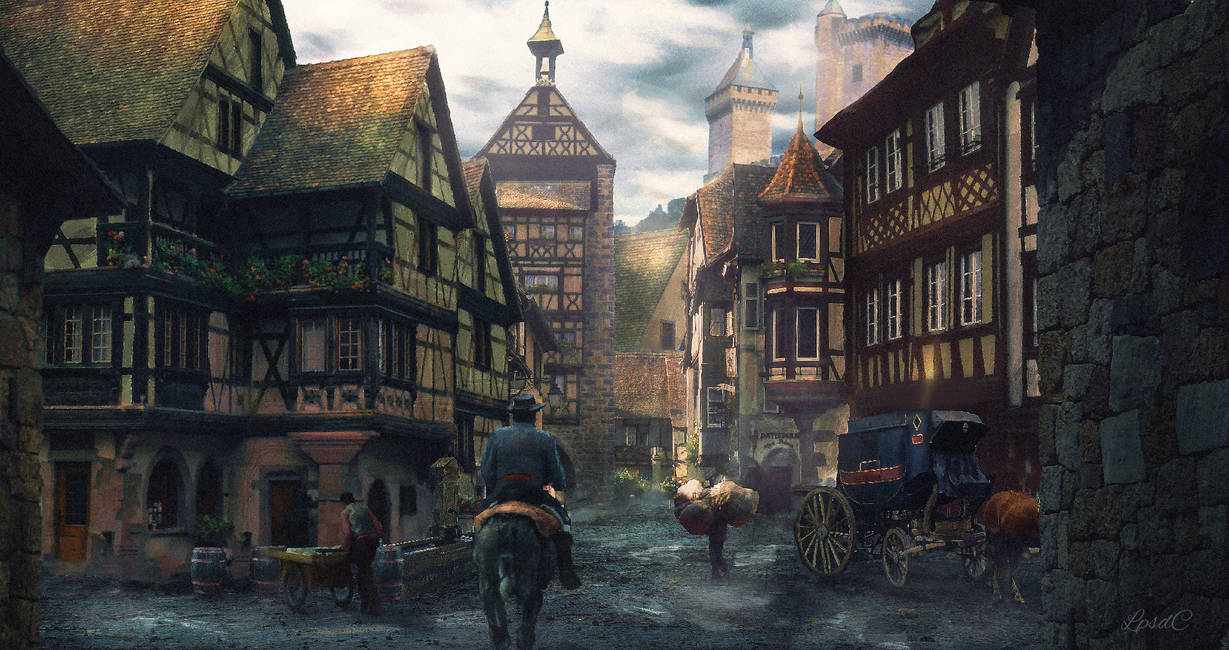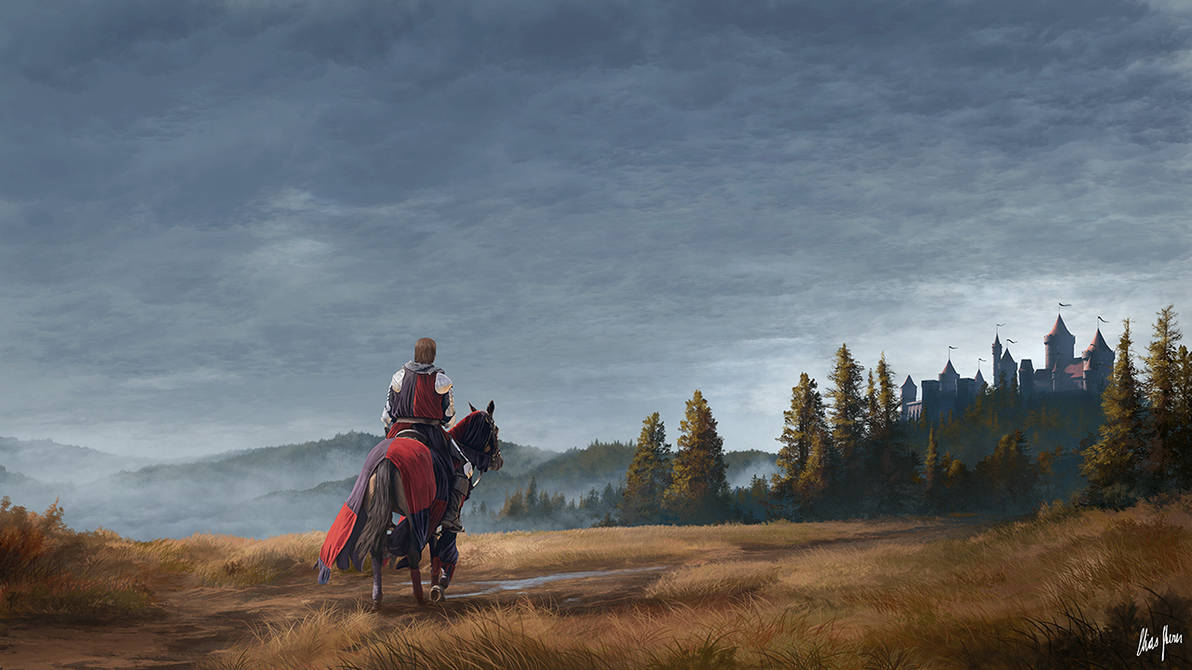A stately castle looms in the rain and fog ahead, like a monarch disinterestly gazing out over the heads of his clamoring subjects. Cute tudor homes and small military forts cluster around the castle walls,
smoke rising from chimneys through the gloomy weather. People hustle to get out of the rain. Lanterns glow outside doors. Fiddles play. As farmers coax the last of their livestock into barns for the
evening, grim men and women in chainmail stand vigilant outside a small stone guardhouse. People in quilt armor and shortswords at their hip, in turn, watch them back. It will rain tomorrow too.
Welcome to Lumbridge.

Misthalin's second great city. Lumbridge sits at more or less the heart of the entire kingdom, which also happens to be the mouth of the River Lum, where she drains into the sea. Here, north of
Lumbridge Swamp, the weather is markedly cooler and wetter. Helpfully, the soil is also much more fertile -- Lumbridge and its surrounding area is positively thronged with wheat fields, producing more
than enough grain to feed not only all of Misthalin, but a large amount in export to neighboring Asgarnia as well.
This access to so much farmland naturally means Lumbridge has one of the highest densities of pubs in Gielinor, even beating out the likes of dwarvish settlements such as Lassar (dwarves are known to depend on
beer for survival). The markets overflow with bread as soft as clouds and cheese more sharp and finely aged than any in Gielinor. The scent of pies from apple to shepherds stalks the likes of Baker Street
and the promenade of the Lumbridge chapter of the Culinary Guild of Misthalin, coaxing would-be travelers inside to spend their money on the best and most affordable food the kingdom can offer.
Lumbridge is also known for its robust manufacturing sector. The highly sought tin, copper, and iron are plentiful in nearby Lumbridge Swamp, and brave, reasonably competent locals sometimes take on
mercenary work for a few days, guiding miners through the treacherous swamp. The pay isn't terrible for a day's work of trudging through bog water and occasionally fending off the odd giant toad. In turn,
Lumbridge produces a large number of reasonably priced weapons and armor; even soldiers in the Imperial Army have the maker's mark of prominent Lumbridge blacksmiths on their breastplates.

Logging in the Dolmenwood is done when the weather permits; the entire forest is seemingly keen to make travel and work as difficult as possible. In the spring and early summer, it almost becomes a
rainforest as every surface becomes slick with moss. The wood isnt valuable enough to carpenters for it to be worth the hassle of transporting and selling elsewhere, but they make for fine houses in
Lumbridge.
All this material wealth would be fine and good for a stable city. Unfortunately, Duke Horacio, the nobleman whose family has governed Lumbridge for generations under the direct appointment of the Varrockian crown,
is disinterested in the goings-on of his subjects at best and maliciously negligent at worst. Misthalin's monarchy is particularly *extractive*; the bigger the output of a community, the more that community
is expected to pay in coin or material goods to King Aethelsea III. Horacio's father Franizzard had a falling out with the preceding king on this issue, and the bad blood has persisted into the reign of the sons of
these two rulers.
King Aethelsea II put the screws on Lumbridge, increasing their taxes by an additional 50%, which only made Duke Franizzard more stubborn and combative, even refusing to pay taxes at all until the Imperial
Army came knocking. Horacio has since been desperate to curry favor again with the crown despite the tax hike not being lifted. This has resulted in the Royal Guard of Lumbridge (derisively called "dukesmen")
turning into a glorified mob of tax collectors, being given express orders to meet tax quotas "by any means necessary". The emphasis placed on extracting money from the citizens has naturally meant that guard
duty has fallen by the wayside; crime is massively up, and farmers subject to goblin raider bands or monster attacks go unaided.

Frustrated by this negligence, blacksmiths, tailors, bakers, and whomever else had the funds would arm themselves with cheap daggers and cloth armor, trying to help the community themselves. This armed ragtag
militia of disgruntled locals formed a broader policing organization called Iron Lantern, with the stated intention to "assist his highness, the duke Horacio of Lumbridge in the protection of his realm"
(intentionally ironic and subversive when you know their origin story). For his part, Duke Horacio utterly detests Iron Lantern for undermining his authority and for their frequently seditious language.
Clashes between the dukesmen and Iron Lantern are not uncommon.
Despite their almost terroristic angle against the monarchy in recent years, Iron Lantern is beloved and deeply respected for their kindness and generosity when it comes to helping the poor and desperate.
If monsters descend on a group of travelers, it's usually patrolling members of Iron Lantern that rush to slay the beasts. The tension between locals and the Duke is palpable.
Oh, and Lumbridge has Gielinor's largest (and oldest) Saradominist church -- the Church of Saradomin. Boring name.